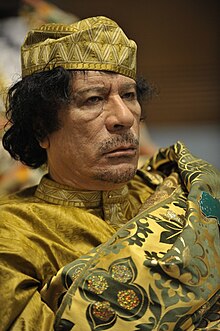 Global Information
Global InformationHistory of Libya under Muammar Gaddafi information


| ||
|---|---|---|
|
||
Muammar Gaddafi became the de facto leader of Libya on 1 September 1969 after leading a group of young Libyan Army officers against King Idris I in a bloodless coup d'état. After the king had fled the country, the Revolutionary Command Council (RCC) headed by Gaddafi abolished the monarchy and the old constitution and established the Libyan Arab Republic, with the motto "freedom, socialism and unity".[1] The name of Libya was changed several times during Gaddafi's tenure as leader. From 1969 to 1977, the name was the Libyan Arab Republic. In 1977, the name was changed to Socialist People's Libyan Arab Jamahiriya.[2] Jamahiriya was a term coined by Gaddafi,[2] usually translated as "state of the masses". The country was renamed again in 1986 as the Great Socialist People's Libyan Arab Jamahiriya, after the United States bombing that year.
After coming to power, the RCC government initiated a process of directing funds toward providing education, health care and housing for all. Public education in the country became free and primary education compulsory for both sexes. Medical care became available to the public at no cost, but providing housing for all was a task the RCC government was unable to complete.[3] Under Gaddafi, per capita income in the country rose to more than US$11,000, the 5th highest in Africa.[citation needed] The increase in prosperity was accompanied by a controversial foreign policy, and increased domestic political repression.[1][4]
During the 1980s and 1990s, Gaddafi, in alliance with the Eastern Bloc and Fidel Castro's Cuba, openly supported rebel movements like Nelson Mandela's African National Congress, Yasser Arafat's Palestine Liberation Organization, the Provisional Irish Republican Army and the Polisario Front. Gaddafi's government was either known to be or suspected of participating in or aiding attacks by these and other proxy forces. Additionally, Gaddafi undertook several invasions of neighboring states in Africa, notably Chad in the 1970s and 1980s. All of his actions led to a deterioration of Libya's foreign relations with several countries, mostly Western states,[5] and culminated in the 1986 United States bombing of Libya. Gaddafi defended his government's actions by citing the need to support anti-imperialist and anti-colonial movements around the world. Notably, Gaddafi supported anti-Zionist, pan-Arab, pan-Africanist, Arab and black civil rights movements. Gaddafi's behavior, often erratic, led some outsiders to conclude that he was not mentally sound, a claim disputed by the Libyan authorities and other observers close to Gaddafi. Despite receiving extensive aid and technical assistance from the Soviet Union and its allies, Gaddafi retained close ties to pro-American governments in Western Europe, largely by courting Western oil companies with promises of access to the lucrative Libyan energy sector. After the 9/11 attacks, strained relations between Libya and NATO countries were mostly normalised, and sanctions against the country relaxed, in exchange for nuclear disarmament.
In early 2011, a civil war broke out in the context of the wider Arab Spring. The rebel anti-Gaddafi forces formed a committee named the National Transitional Council in February 2011, to act as an interim authority in the rebel-controlled areas. After killings by government forces[6] in addition to those by the rebel forces,[7] a multinational coalition led by NATO forces intervened in March in support of the rebels.[8][9][10] The International Criminal Court issued an arrest warrant against Gaddafi and his entourage in June 2011. Gaddafi's government was overthrown in the wake of the fall of Tripoli to the rebel forces in August, although pockets of resistance held by forces in support of Gaddafi's government held out for another two months, especially in Gaddafi's hometown of Sirte, which he declared the new capital of Libya in September.[11] The fall of the last remaining sites in Sirte under pro-Gaddafi control on 20 October 2011, followed by the subsequent killing of Gaddafi, marked the end of the Libyan Arab Jamahiriya.
- ^ a b "Libya: History". GlobalEDGE (via Michigan State University). Archived from the original on 20 June 2010. Retrieved 14 August 2011.
- ^ a b Kadhafi, Mouammar; Barrada, Hamid; Kravetz, Marc; Whitaker, Mark (1984). Kadhafi : "je suis un opposant à l'échelon mondial" (in French). Paris: P.-M. Favre. p. 104.
- ^ "Housing". Encyclopædia Britannica. Archived from the original on 28 November 2011. Retrieved 14 August 2011.
- ^ "Comparative Criminology – Libya". Crime and Society. Archived from the original on 7 August 2011. Retrieved 24 July 2011.
- ^ van Genugten, Saskia (18 May 2016). Libya in Western Foreign Policies, 1911–2011. Springer. p. 139. ISBN 9781137489500.
- ^ Crawford, Alex (23 March 2011). "Evidence of Massacre By Gaddafi Forces". Sky News. Archived from the original on 19 July 2012. Retrieved 25 October 2011.
- ^ McGreal, Chris (30 March 2011). "Undisciplined Libyan rebels no match for Gaddafi's forces". The Guardian. ISSN 0261-3077. Archived from the original on 23 September 2017. Retrieved 29 April 2017.
- ^ "Western nations step up efforts to aid Libyan rebels". The Washington Post. Archived from the original on 3 March 2017. Retrieved 29 April 2017.
- ^ "America's secret plan to arm Libya's rebels". The Independent. 7 March 2011. Archived from the original on 4 September 2017. Retrieved 29 April 2017.
- ^ "France sent arms to Libyan rebels". The Washington Post. Archived from the original on 18 September 2012. Retrieved 29 April 2017.
- ^ "Libya crisis: Col Gaddafi vows to fight a 'long war'". BBC News. 1 September 2011. Archived from the original on 13 October 2018. Retrieved 21 June 2018.
